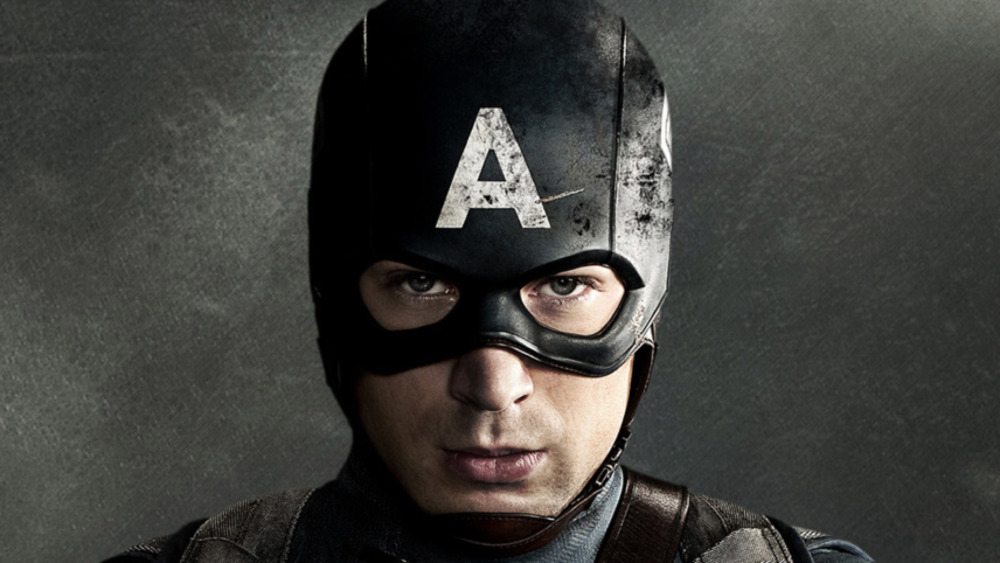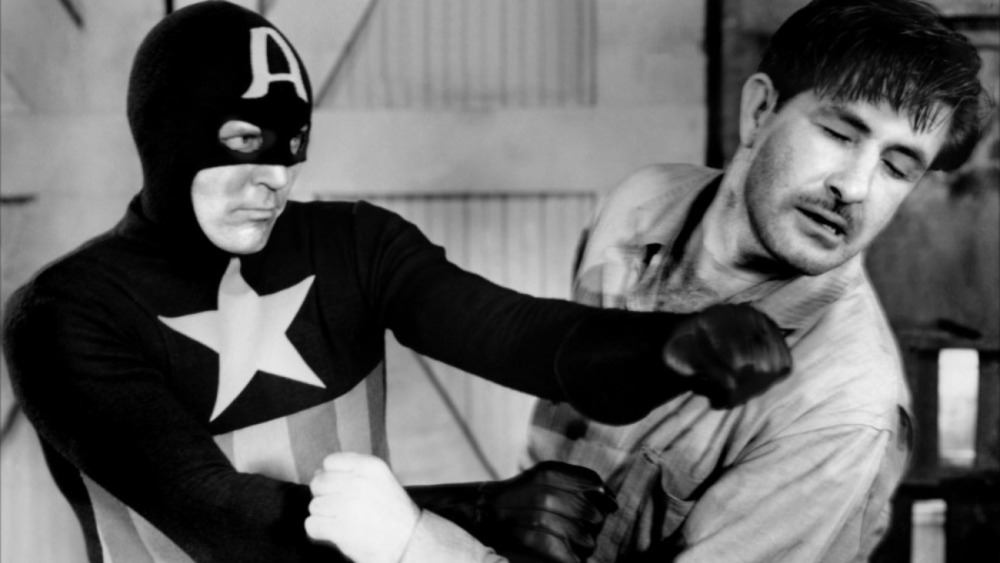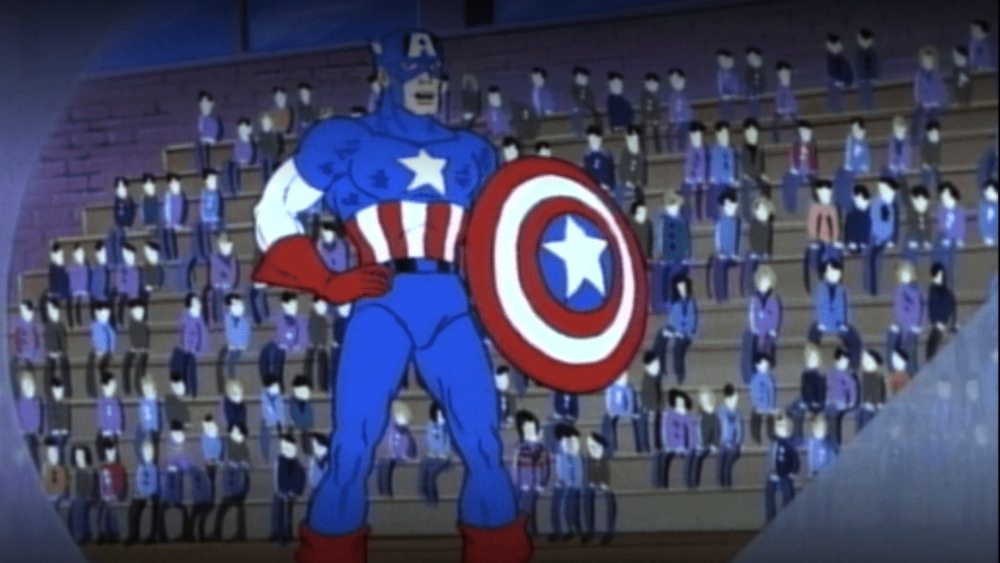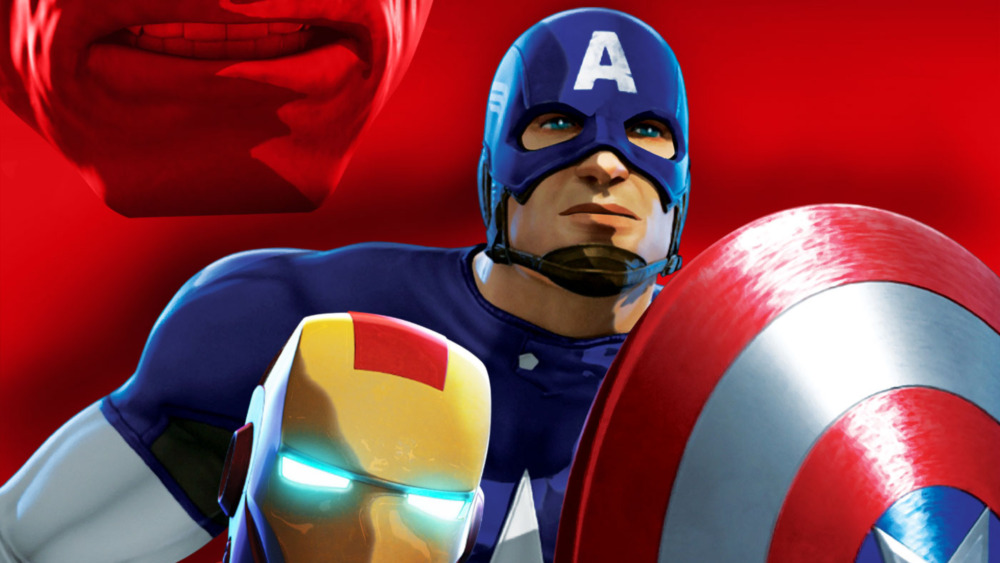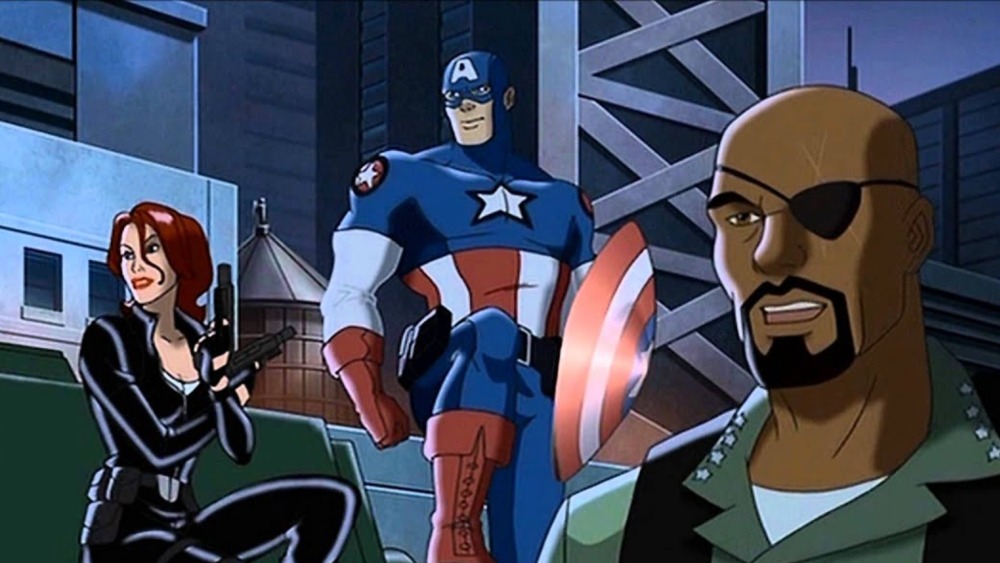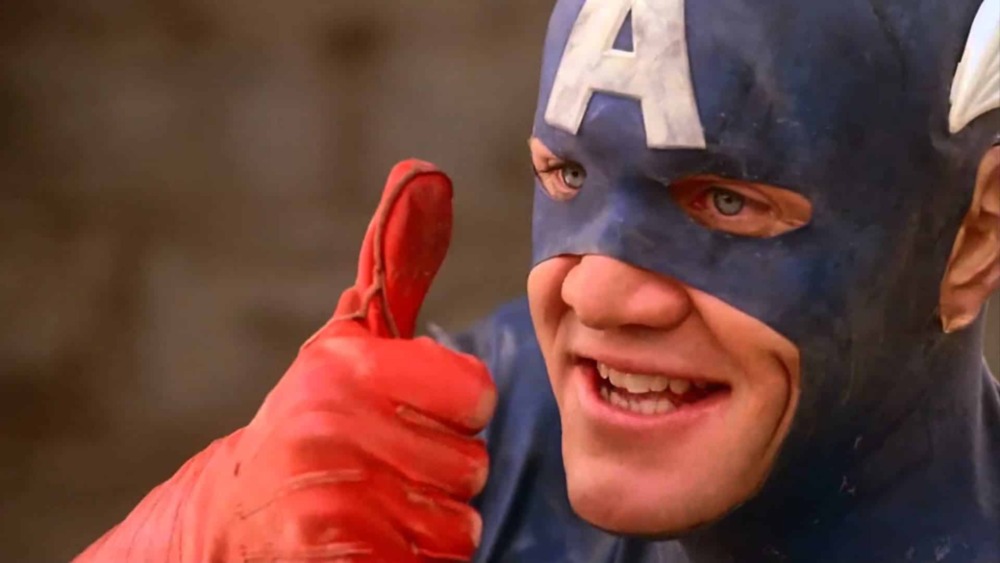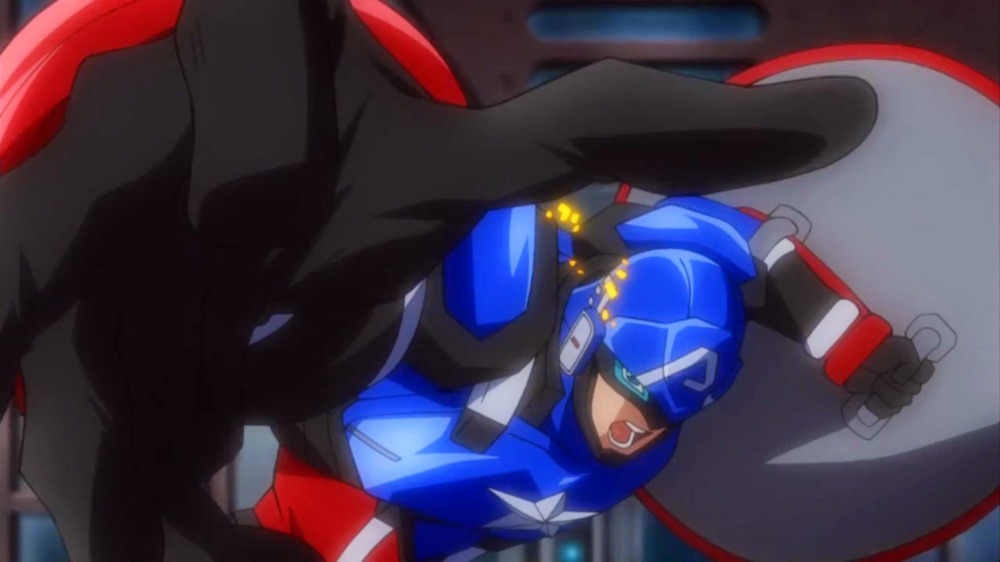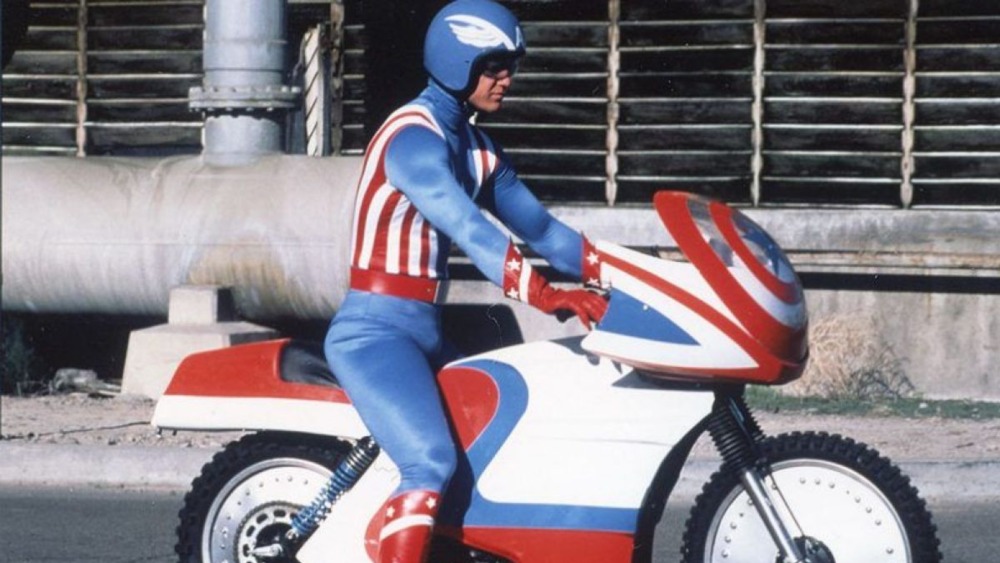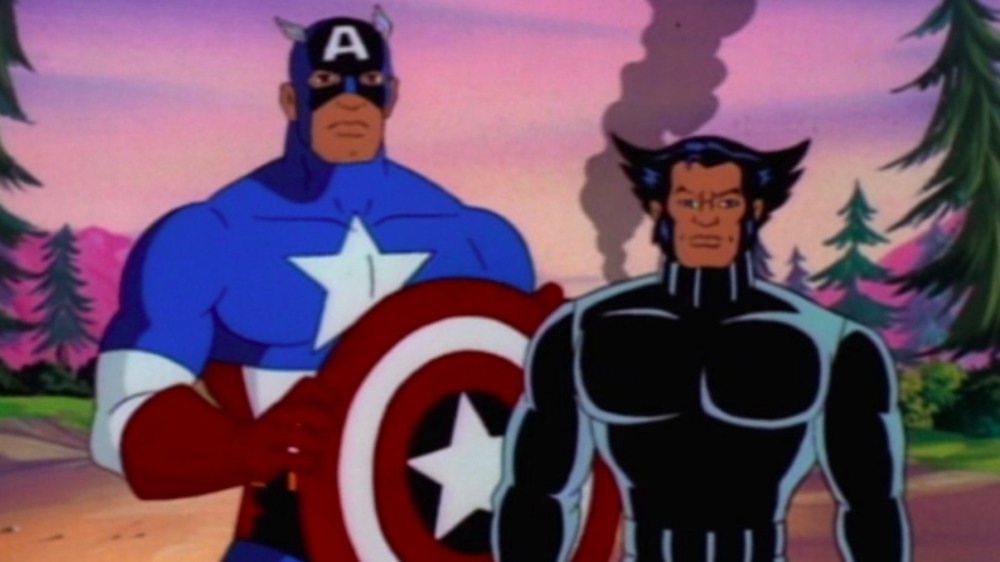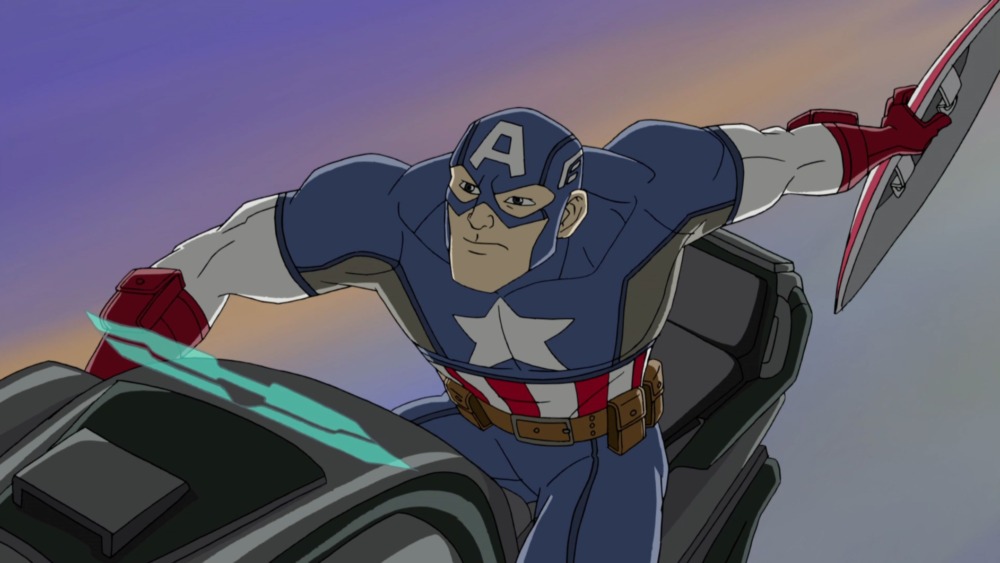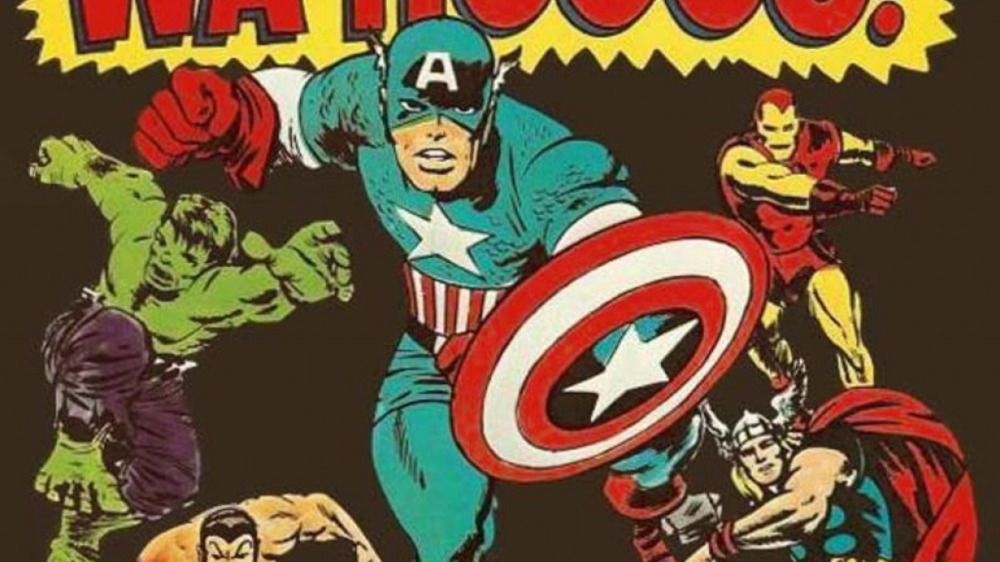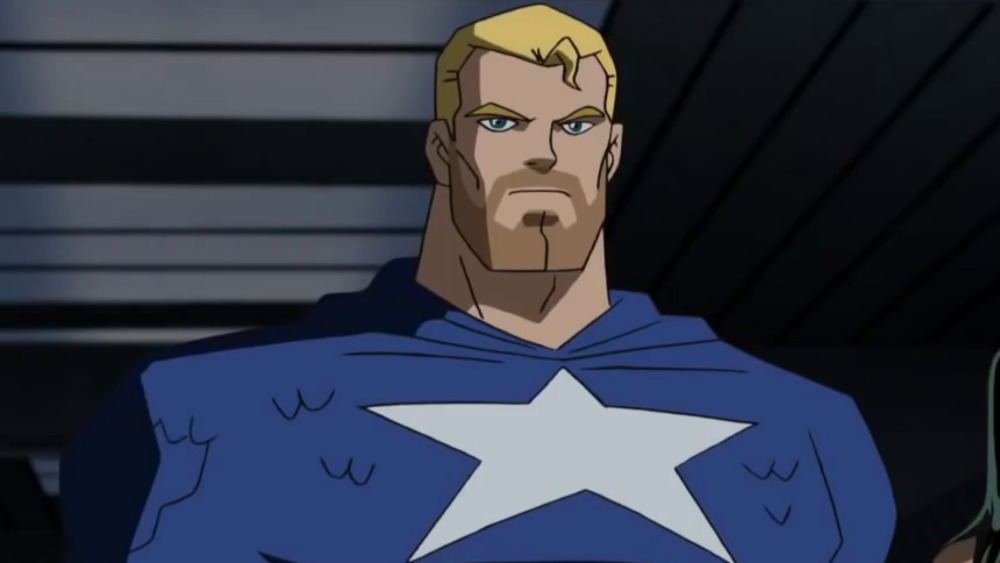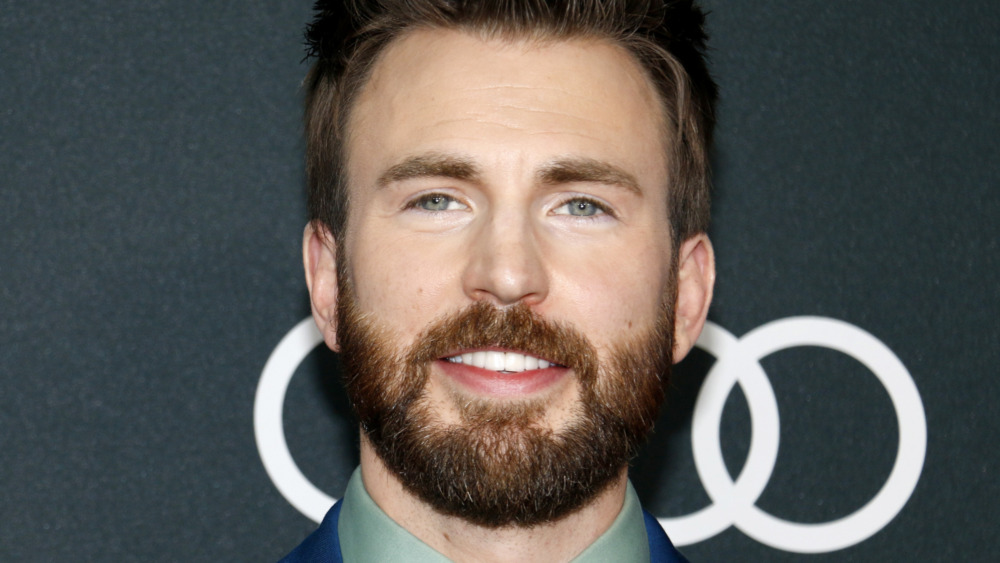Every Adaptation Of Original Captain America Ranked From Worst To Best
The original Captain America, created by Jack Kirby and Joe Simon, made his inaugural appearance in 1941. Cap as we know him — a sidekick-less super soldier displaced from time named Steve Rogers — unthaws in 1964's Avengers #4. So yeah, he's been around for a minute. Perhaps due to the character's fairly consistent popularity and lack of any visually-complicated superpowers, Steve made it off the page and onto the screen before most of his contemporaries. Indeed, the star-spangled soldier has popped up in plenty of movies and TV shows over the years — including many even the most devoted MCU fan likely hasn't heard of.
We'd like to rank all the live-action and animated adaptations of the original Captain America out there, but because he guest stars in basically every Marvel related cartoon, that's sort of impossible. So let's focus on the fully-realized adaptations: Projects where Steve Rogers is one of the main characters, included for more than one episode, and whose demographic meets a certain maturity requirement. No disrespect to The Super Hero Squad Show or Marvel Super Hero Adventures – we're just going to leave the relative quality of those shows up to the toddlers for whom they are designed.
Which screen adaptations of Steve Rogers wield the shield with might? Which do we wish had just stayed frozen? Join us as we answer that question by ranking every original Captain America adaptation from worst to best.
Captain America (1944): Dick Purcell
1944's Captain America stands as the first instance of a live-action Marvel Comics (then called Timely Comics) adaptation undergoing a theatrical release. It remained the only one of its kind until 1977's Spider-Man, originally a made-for-TV movie, played in international theaters.
While this serial warrants attention for its historic significance, it's hard to say how much it holds up on its own merits. This version of Captain America isn't a World War II super soldier named Steve Rogers, for one thing. Instead, he's a district attorney named Grant Gardner who uses a gun instead of his signature shield. In the first episode, Cap investigates a series of mysterious suicides linked to an ancient Mayan artifact. This really sounds like a job more suited for Batman, the Green Hornet, or any of the other numerous costumed detectives who starred in adventure serials of the era. The cherry on top of this bizarre departure is the fact that nobody ever mentions Bucky, who doesn't seem to exist in this incarnation.
Aside from the name, costume, and a vague sense that they share a powerset, there's little connection between this Captain America and the character in the comics. But what the film lacks in fidelity to its source material, it makes up for in over-the-top Hollywood fight scenes. If that's your thing, it's worth a gander.
Spider-Man and his Amazing Friends (1981-1983): George DiCenzo
The mere implication that Spider-Man and his Amazing Friends is anything less than a groundbreaking cross-media achievement is blasphemy against the nerd gods. So don't get it mixed up: We're not saying there's anything wrong with Amazing Friends, only that the iteration of Steve Rogers who appears in "Pawns of the Kingpin" is not one of Cap's more impressive turns.
Unlike other Captains America, this one's a glory hound who spends loads of time on athletic exhibitions to show off for Empire State University students. Before one such demonstration, he announces, "Today you will see what years of training and exercise have done for me!" Then he performs feats that would be utterly impossible without the super-soldier serum everyone knows gave him his powers, "training and exercise" be darned.
Later, because he's so distracted by all the autographs he's got to sign, he becomes an easy target for the Kingpin's mind control scheme. Not only is this Cap a prima donna, he has a knack for winding up in bad situations and needing Spider-Man to bail him out.
Iron Man and Captain America: Heroes United (2014): Roger Craig Smith
Computer animation can be one heck of a dice roll. We're certainly not experts on the subject, and probably aren't smart enough to understand exactly why or how this is possible. But somehow, Iron Man and Captain America: Heroes United looks like a giant cut scene from an outdated videogame. Yet somehow, you could convince us 1995's Toy Story came out yesterday, if we didn't already know better. Something's gone wrong here, but we're not sure exactly what.
Instantly dated though it may be, Heroes United is significant for being one of the first contemporary instances of Cap getting brainwashed into joining HYDRA. This idea would prove aggressively unpopular years later when replicated in Secret Empire, a 2017 Marvel Comics crossover storyline. Then again, Cap's notorious proclamation of HYDRA loyalties at Secret Empire's onset paved the way for one of the most gut-busting moments in Avengers: Endgame, so we suppose it all comes out in the wash.
Ultimate Avengers (2006): Justin Gross
Ultimate Avengers: The Movie and Ultimate Avengers 2: Rise of The Panther predate Robert Downey Jr.'s first on-screen outing as Tony Stark by roughly two years. Therefore, their audience didn't necessarily understand they were being prepared — or should we say indoctrinated? — to go see a series of live-action Avengers movies.
But if you happen to catch a glance at an Ultimate Avengers box, the characters' costume designs might give you the wrong idea. Bryan Hitch's artwork from 2002's Ultimates comic series clearly influenced the aesthetic of Ultimate Avengers, which makes its marketing inherently confusing. The Ultimates, written by Mark Millar, reimagines Earth's mightiest heroes in a post-9/11 setting with a grim-and-gritty attitude. But Ultimate Avengers: The Movie is a pretty cut-and-dry Avengers origin story — maybe a bit too mature for the littlest kids, but a far cry from the frequently discomfiting territory The Ultimates slides into far too often.
Hardly anyone at the time understood why these films existed, and they were quickly rendered superfluous by superior Avengers cartoons. On a positive note, Bucky survives World War II and grows up to be an old man in this version of the story, which we like. Bucky deserves to catch a break now and again.
Captain America (1990): Matt Salinger
Is 1990's Captain America really as bad as its dismal Rotten Tomatoes score makes it out to be? Is it possible that audiences of the time got their hopes up for Marvel's answer to 1989's Batman, and had their spirits crushed by a mediocre, straight-to-VHS action romp? Of course, this movie isn't particularly good, but it's only terrible because it made us think Marvel superheroes wouldn't work as movies. People hated it for a since-discredited idea it didn't even support on purpose.
Next to the 1944 serial and 3 Dev Adam, this version of Steve Rogers feels comparatively true to its source material. This Cap, at the very least, gets his powers via a super soldier program in WWII, gets frozen, and ends up having to awkwardly adjust to modernity once he unfreezes. However, it's not all true to the comics: Red Skull is inexplicably Italian, and Cap's mask includes deeply creepy rubber ears, presumably as a means to strike additional terror into his adversaries.
Here's a fun factoid for you literary folks: Matt Salinger, who plays Steve, is the son of Catcher In The Rye author J.D. Salinger. This feels appropriate — after all, Steve Rogers and Holden Caulfield feel the same way about phonies.
Marvel Disk Wars: The Avengers (2014-2015): Kazuhiro Nakaya/Roger Craig Smith
We don't want to sound overly dismissive of an Avengers adaptation that isn't targeted at an English-speaking audience. This adaptation may very well fly over our heads, only to land gracefully and with precision for the Japanese kids it's meant for. But, if we understand correctly, Disk Wars is basically a Pokémon-Avengers combo endeavor, in which Cap and his teammates are trapped in pocket-sized plastic disks and must be summoned when a combat-situation arises. We can't decide if that's the stupidest thing we've ever heard, or the coolest thing we've ever heard.
It's not an ideal concept for Cap, however, who's a little too much of an anachronism to fit into a Pokémon-style world. Even when the storyline continues in Marvel Future Avengers, an anime series that drops the shtick with the disks, Cap doesn't necessarily make a case for himself as an anime star. Meanwhile, there's Deadpool ... and that's a different story altogether.
Captain America (1979): Reb Brown
In 1979's made-for-TV movies, Captain America and Captain America II: Death Too Soon, Steve Rogers is a monumentally chillaxed and creative dude who's never seen an Arctic ice field in his life. His father served in World War II, which means by the time Steve was born, Hitler was already too dead to punch.
Late '70s Steve tosses around a shield, but he also cruises in a customized red, white, and blue motorcycle that converts into a hang glider for the frequent occasions in which he finds himself needing a hang glider. This Cap's also got a tricked-out van, similar to the Turtle Van that appears in the first Teenage Mutant Ninja Turtles cartoon roughly 10 years later. As for the bulky blue and white helmet that doesn't always cover Cap's face ... well, it's a choice.
This Cap strays too far from the original for us to really consider him an authentic Captain America. But even if he's not Cap, he seems kind of awesome. Could it be that CBS would've had a hit on their hands if they'd repackaged all these ideas into a new superhero called "Dr. Democracy" or "Patriotic Bike-Ridin' Butt Kicker"? Isn't that pretty much how Marvel accidentally created G.I. Joe?
The '90s animated Marvel Universe: Lawrence Bayne/David Hayter/Dan Chameroy
The '90s was a pretty wild time for Marvel animation. X-Men kicked off in 1992, setting the template for that era's batch of shows. Spider-Man, Fantastic Four, Iron Man, The Incredible Hulk, and Avengers: United They Stand all went on to wildly varying degrees of success. Their interconnected continuity isn't as overt, or as important, as it is in the Marvel Cinematic Universe, or even as it typically is in the comics. But nevertheless, it's certainly the most ambitious shared universe Saturday morning cartoons could possibly muster at the time.
Captain America teams up with Wolverine in a World War II flashback in X-Men's "Old Soldiers." He also makes multiple appearances in Spider-Man, most prominently during the Secret Wars crossover, which also includes the Fantastic Four, Iron Man, and the Black Cat. This Captain America marks the millennial generation's first exposure to a solidly-executed, almost-comics-accurate version of the character, which in and of itself ensures it carries much influential heft.
Let us also note that David Hayter — yes, that David Hayter — resumed the role in an episode of X-Men Evolution, "Operation Rebirth." That show takes place in a different timeline, but it's worth mentioning because Evolution's iteration of Cap rescues child Magneto from a Nazi concentration camp. In the long run, that means the entire mutant race has Cap to thank for one of its most influential leaders.
Avengers Assemble (2013-2019): Roger Craig Smith
This rendering of Marvel's signature team remained on the air for longer than any other Avengers show, and it just so happens to coincide with the team's all-time highest level of cultural visibility. So, if we're ranking these Captains America partially on their scope of influence, even a casual and infrequent Avengers Assemble viewer would have to place its Cap among the mightiest of this lot.
During the '90s explosion of Marvel animated projects aiming to capitalize on X-Men's success, Cap never got his own show. That means Assemble, with about half a decade on the air, contains a larger total quantity of televised Captain America than you'll find in any other existing animated Marvel timeline.
But, if we may pick a nit, a viewer might notice that the Roger Craig Smith-voiced take on Steve Rogers comes close to flat-out mimicking Chris Evans' MCU performance. So while we've got to dock this Cap some points for a lack of creativity, perhaps it earns those points back for its strength of cross-media synergy.
The Marvel Super Heroes (1966): Sandy Becker
Today, The Marvel Super Heroes is better understood as pop art, rather than action-centric television. You've only got to pull Cap's adventures barely out of context to recreate them as surreal, mind-expanding fever dreams. But the Warholian elements of 1966's Cap aren't the sole reason for his high status on this list. Each of the show's heroes boasts his own theme song penned by composer Jack Urbont, and Cap's musical call-to-attention is the only jingle from that generation of Marvel cartoons many folks remember today.
"When Captain America throws his mighty shield," the tune trumpets, "all those who choose to oppose his shield must yield! If he's led to a fight, and a duel is due, then the red and the white and blue will come through, when Captain America throw his mighty shiiiieeeeld!" In terms of classic superhero songs, that one's almost up there with Batman's iconic "Na na na na na na na na," and that tune about Spider-Man doing whatever a spider can. It's iconic as all get-out, and pairs beautifully with this cartoon's out-there aspects.
Avengers: Earth's Mightiest Heroes (2010-2012): Brian Bloom
After Iron Man hit theaters and revealed Marvel Studios' intention to assemble the Avengers on screen, plenty of people weren't sure exactly how that would look. This strange and ambiguous period in Marvel-licensed media resulted in The Avengers: Earth's Mightiest Heroes, which originally aired on Disney XD.
Ever wanted to know how the MCU might pan out if Hank Pym and Janet Van Dyne co-founded the Avengers? Or if Black Widow eschewed Avengers membership and stuck to professional espionage? How about if Black Panther joined the team in a more official capacity, and much earlier? What might've happened if the secret Skrull invasion took place before Iron Man and Cap left the franchise? The answers to these questions, and many more, can all be found within Earth's Mightiest Heroes. No wonder fans adore it.
Earth's Mightiest Heroes' Captain America carries himself a bit more obviously like an old man in a younger man's body than other entries on this list. He also pushes back against Iron Man's confidence in the value of futurism, and gives him grief about having no idea what to do in a fist fight. He's multifaceted, entertaining, and part of the best Avengers cartoon ever made.
The MCU (2011-2019): Chris Evans
By the time Captain America: The First Avenger arrived, we had seen one or two reverent, well-executed animated incarnations of Steve Rogers. But prior attempts to transfer the star-spangled soldier to live-action hadn't panned out especially well. Perhaps there will always be doubt as to whether a superhero with an unabashedly optimistic disposition "works as a movie," because whatever era we happen to be living in always feels too dark to take such a sunny concept seriously. (Except for the late 1970s, for some reason.) But in future debates, fans will be able to point to The First Avenger, which broke that cycle. In its wake, Cap swiftly became one of the MCU's most popular characters.
In his performance, Chris Evans emphasizes the "kid from Brooklyn" aspect of Cap over his super soldier side. His temporal displacement is mostly played up for corny humor, rather than as an ever-present source of angst or resentment. This leads to a lot of great jokes, and also means that when his man-out-of-time-ness is taken seriously, it hits all the harder.
Moreover, despite being a century-old metahuman, Cap adds a much-needed sense of down-to-Earth relatability to an ensemble of billionaires, gods, robots, and monsters. Evans also gets most of the coolest moments in Endgame: He finally says the famous catchphrase from the comics, tosses Mjolnir around, beats up his past self, and declares his own posterior to be "America's ass." It's all phenomenal stuff.
